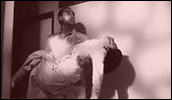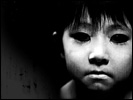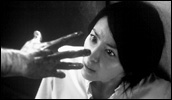Juon
- Year
- 2002
- Original title
- Juon
- Japanese title
- 呪怨
- Alternative title
- The Grudge
- Director
- Cast
- Running time
- 92 minutes
- Published
- 23 December 2002



by Jasper Sharp
A bluing hand brushes your naked skin as you stand beneath the shower. A glimpse of something in the corner of your eye - is it only a reflection in the window pane, or something more tangible? A nightmare in which your bed swarms with black cats as you lie there half-sleeping. A teenage schoolgirl blocks the windows of her room with shreds of newspaper to shield her from the hollow-eyed apparitions that stare in from the darkness outside. In the heart of a deserted house sealed up in duct tape, an old woman gazes blindly into space, her face frozen by fear into an inscrutable mask. Skulking deep in the shadows of the attic crawlspace, caught in a limbo between light and darkness, something evil is stirring.
It's amazing to think that it has been five years since Hideo Nakata first brought Sadako to our screens with Ring, a film that swept from East to West across the box offices of Asia and Europe with all the power and potency of Genghis Khan, bringing a much needed gust of fresh air into the stale and hermetic arena of late 1990s horror. The first stream of succinct supernatural chillers to follow in its wake already seemed to have run its course by the time Hollywood got round to the remake, with the tail end represented by the likes of St John's Wort and Isola unlikely to convince anyone of the uniform greatness of Japanese genre filmmaking. However, with Gore Verbinsky's version newly unleashed across the globe and drawing attention back to the source of the original, the time is surely ripe for the next wave of Asian terror.
Accompanied by a poster campaign that is perhaps a little too reminiscent of Ring 2, Juon leaves us in no doubt that it's heading for the same sort of, and presumably same size of, audience as its model. And let's face it, it is most certainly in the right place at the right time for anyone looking for a worthy successor. The question is, does it have anything to make it stand out from the rest of the crowd of wannabes that followed that first film - the vitality of Versus, the audacity of Audition, or the idiosyncrasy of Uzumaki, perhaps? Or are we instead left with the crassness of Kakashi or the inertia of Inugami?
An alumnus of the Film School of Tokyo, studying beneath horror maestro Kiyoshi Kurosawa and Ring scriptwriter Hiroshi Takahashi (both credited as "Creative Consultants" on this film), before making his official feature debut in 2001 with Tomie: Rebirth, the third in the series based on Junji Ito's popular horror manga, director Takashi Shimizu first came to the attention of Japanese horror fans in a big way in 2000 with the two straight-to-video shockers Juon and Juon 2. It is these two original videos, much vaunted in some quarters, that form the basis of his second feature, which retains both the title and the premise whilst sticking firmly within the same ghoulish setting, yet discards the internal details.
Adopting the same onryo, or vengeful ghost, scenario that has run through the heart of the Japanese horror movie since day one, Juon goes one better than Sadako's abused child psychic and gives us not one, but a whole family of bluing, obsidian-eyed revenants from the Netherworld, the house's original victims, murdered by the head of the family. The most memorable of these is the pallid six-year-old Toshio, who lurks continuously just beneath the eye-line of his victims, compulsively drumming his fingers whilst crouching mischievously as if conjured from the famous Fuselli painting that Freud had hung in his surgery.
Playing like a supernatural version of Max Ophuls' La Ronde, its running length divided into a series of segments that culminate in the demise of each newly introduced character, the chain is initiated when, with the original family occupants already slaughtered, social worker Rika (played by Okina, whose previous credits include St Johns Wort, and Red Shadow) is sent to check up on the sole surviving household member, a bed-bound old lady, only to witness her devoured by a black, vapour-like smudge before her very eyes. From then on, all who come into contact with the previous victim are sure to die, as the sickening miasma spreads from its original source throughout the neighbouring environs.
The horror genre has never been overly reliant on plot logic - on the contrary, it often attracts the most criticism when it does try to touch base with reality - but using this approach means that Juon doesn't really have to try, settling into a series of short, chilling sequences that skirt around the centre of the mystery without offering much in the way of exposition or explanation. This isn't necessarily a criticism. If anything, refusing to let the viewer off the hook by means of a tidy resolution merely serves to enhance the creeping feeling of unease that seeps throughout the majority of the film. Juon may be a little raw looking at times, but for the most part, it's damn effective at what it does, evoking the same cloying claustrophobia and shuddering sense of unease that has reverberated through such exemplary offerings in the Old Dark House genre as The Amityville Horror and Lucio Fulci's House by the Cemetery. More credit to Shimizu, then, for managing to come up with something that looks like none of these.
If you're not the type of viewer to be bothered by characters so stupid that they react to their oncoming demise by pulling the duvet cover over their heads, and are happy to bathe yourself in Juon's macabre atmosphere without needing to worry about the whys and wherefores of the plot, then Shimizu presents us with a nightmare with the potential to run and run, and I have a sneaking suspicion that Toshio's skulking presence could reach just as far beyond its boundaries as Sadako's.